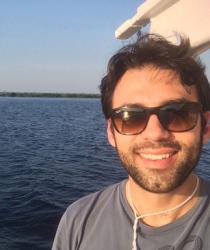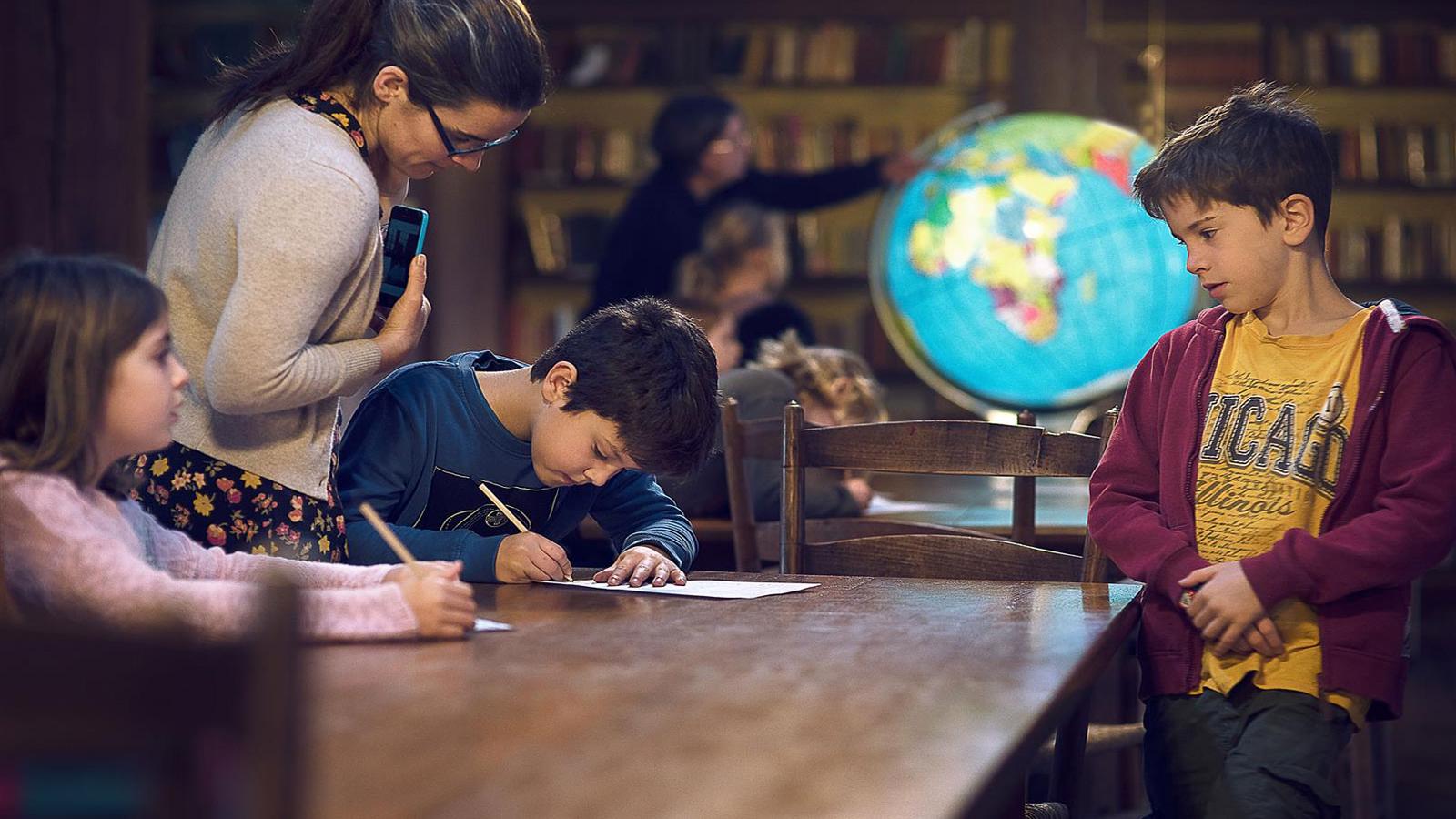
Henrique Dolabella’s introduction to Bedales was entirely the result of coincidence – the man who was to become his step-father was one of the school’s legendary cohort of teachers! Harry Pearson, mentor to a generation of chemistry students at Bedales, was one to take his holidays in Brazil, where he would eventually meet Henrique’s mother. “Before I came to the UK, I’d been at school in Brazil for around seven years and my memories of those days are mixed, in all honesty,” Henrique says. “There is a big gap between Brazilian private and state schools and I was at state schools, where the quality gradually seemed to worsen as I got older. The early days were pretty good but things went downhill a bit after that.”
At the age of twelve, therefore, Henrique was on his way to a new country, whose language he didn’t speak at all. His first educational stop in England would be The Petersfield School (TPS). “Instead of studying French, I took English,” he explains. “That was my foreign language. Nevertheless, I enjoyed myself at TPS, particularly maths, which suddenly, for obvious reasons, became the most interesting subject to me. Even though I lived in the Wing, Bedales was still somewhat distant from my reality at that stage.”
By the year 2000, Henrique was judged ready to join his step-father at Bedales on a permanent basis. “Harry never talked too much about Bedales to me, partly, I think, because he didn’t want to give me any unrealistic expectations,” Henrique reflects. “For myself, I wasn’t too sure how I might fit in, bearing in mind that my English was still not that great and Bedales is obviously quite an academically demanding place. Financially, it would be a struggle too – Brazil had gone through an economic crisis towards the end of the 1990s and as a result the Real, the local currency, had halved in value against the pound. Still, my parents managed and I was particularly looking forward to playing sports in the great facilities, even though I wasn’t especially desperate to change schools.”
Bedales proved to be a place with an atmosphere to which Henrique could immediately relate. “Brazil is a pretty informal country and Bedales, with its absence of a school uniform and first name terms with the teachers was something that was familiar to me in that sense,” he says. “Everyone was extremely friendly right from the word go and the only worry was to try and make sure that you didn’t repeat what you were wearing too often!”
Richard Sinclair, my tutor, was unbeatable. He was always attentive to how I was doing and his generosity and sheer humanity were powerful, character-forming forces
As luck would have it, Harry Pearson was responsible for his step-son’s progress in chemistry. “His classes were pretty chilled and Harry was a great communicator and educator, simultaneously laid back but rigorous,” Henrique recalls. “Probably my two biggest academic influences, though, came in different subjects. Graham Noble, my history teacher, was responsible for changing the way in which I structured my thinking and in geography, Colin Prowse fostered a healthy scepticism, showed me how to think outside the box and not to accept everything that I was taught at face value. Colin also wasn’t afraid to deliver a well-timed metaphorical kick up the backside when I needed it! On a human note, Richard Sinclair, my tutor, was unbeatable. He was always attentive to how I was doing and his generosity and sheer humanity were powerful, character-forming forces.”
Outside the classroom, Henrique, as he had hoped, became an enthusiastic participant on the tennis court and the cricket pitch. His passion for cricket has continued undimmed long after his Bedales days; since returning to Brazil, he has played an whole-hearted part in the development of the sport in his native country, mixing executive work with regular selection for the national squad despite being, in his own words, “an authentic number 11”. Henrique’s Brazilian heritage dictated that he would also be a regular on the football field: “I played for Petersfield Town for a bit, as well as at Bedales, but when you come from Brazil, everyone expects you to be a Pelé or a Zico! I wasn’t any good and regularly failed to live up to expectations – perhaps my most English trait!”
Meanwhile, Henrique was also discovering a taste for the stage. “Well, I took part in a couple of plays, anyway,” he says. “That taught me a lot – I could never have imagined beforehand how much talent and effort went on behind the scenes in putting these shows on. Throughout these two years, I was changing a lot as a person but I was also so conscious that I had hit the jackpot in going to Bedales and that I had to make the most of my good fortune as much as I could. After Block 5, my plan had always been to carry on at Bedales and go to university in the UK, so I wasn’t too pleased when the decision was made for me to head back to Brazil instead.”
The differences in university education structures between Brazil and the UK are marked. “To get into university in Brazil, you take an entrance exam and when I passed that, I enrolled at the University of Brasília, my home city, to pursue a degree in Economics,” Henrique explains. “My peers were slightly older than me but it’s entirely normal for Brazilians to begin university at seventeen years of age, a touch older than I was at the time. I studied while living at home in Brasília and I must say that Brazil was going through a really optimistic phase just then. Lula had just been elected president and there was a contagious enthusiasm everywhere.”
Schools can so often be one-dimensional places where students are judged by a single metric and diversity isn’t always encouraged. Bedales was the complete opposite – people there knew how important it is to develop talent in all its students
Brasília itself is a city for which Henrique remains an ardent advocate. “I’m highly biased but I absolutely love it,” he says. “To me, it mixes the best aspects of rural life with the fun of living in a big city. Of course to some extent, I have tended to live in a high-income bubble here and not everything is quite that rosy, but there are a lot of green spaces to enjoy, it’s much safer than most of the major cities in Brazil, and it also has fantastic architecture and urbanism for those who are converted, like me.”
After a brief sojourn in São Paulo to begin a Master’s which he was unable to finish because his father had suffered a stroke, Henrique was ready to consider his career options. “I had always felt that the civil service would suit me,” he says. “Patience is a quality that I happen to possess and you need lots of it to work in the civil service. There is a hierarchy, of course, but there must be a minimum consensus among all players and, therefore, every decision that is ever made has to be exhaustively debated.”
Henrique accordingly began working life with the Brazilian Civil Aviation Regulatory Agency in 2010 before moving to the Environment Ministry as an aide to the Deputy Minister, helping to design regulations for institutions dealing with biodiversity conservation and ecosystem markets. “It was very different to anything that I’d done before but after a couple of months of struggle, I started to adapt to it,” he says. “Within that Ministry, there are so many different stakeholders to deal with – indigenous people, academics, businesses and toughest of all, MPs and other bureaucrats. When we were going deep into policy issues, it was always the MPs who found it especially difficult to get a grip on the detail involved. My Bedales experience came in so handy; I had learned there that no matter how hard people are trying to aim for a common goal, there will always be different opinions about how to reach it. Basically, you have to keep the machine well-oiled or it jams.”
Today, Henrique is the Executive Manager of Forest Concessions with the Brazilian Forestry Service, a role that sees him regularly visiting the vast Amazon Basin and attempting to further a wider understanding of how sustainable logging works: “The protocol is well understood and it if it’s properly implemented, it is a great resource, but it’s not intuitive to some people and a lot of them are sceptical. To some degree, I have to be a salesman as well as a policy expert.”
As a government consultant in Brazil, Henrique can expect to spend his future career bringing his expertise to other ministries. “The same sort of thing in a different space is quite normal in my line of work and somewhere like the Health Ministry could be next on my agenda,” he says. “In many ways, this is the only career in which I could get the kind of variety I’m enjoying, I fell into it almost by accident and I love it.”
Henrique is only too happy to give due credit to Bedales for its role in his life after he left the school. “It was only two years but I learned so much there,” he says. “I discovered that everyone has a talent where they can shine, for a start. Schools can so often be one-dimensional places where students are judged by a single metric and diversity isn’t always encouraged. Bedales was the complete opposite – people there knew how important it is to develop talent in all its students and I’ll always be grateful to the school. It’s been a while since I was back there – 2007 was the last time and I missed the 2014 reunion because I happened to have tickets for the World Cup in Brazil – but it’s definitely my intention to return as soon as I can.”
